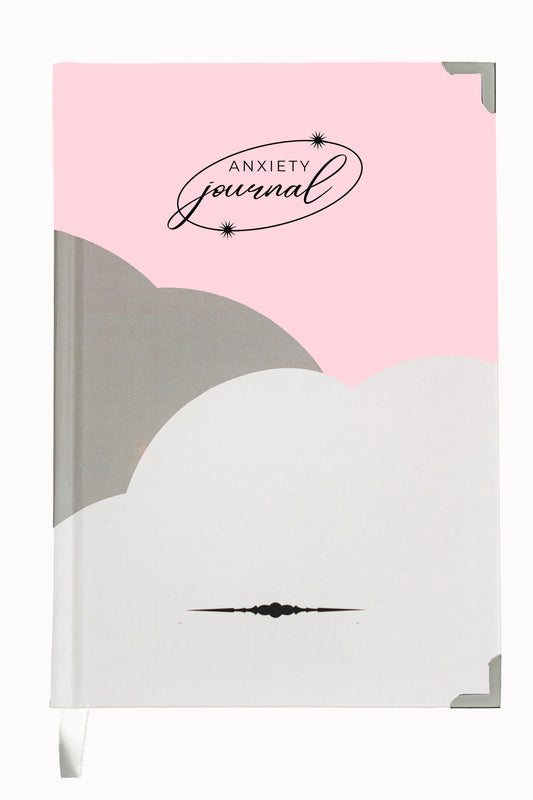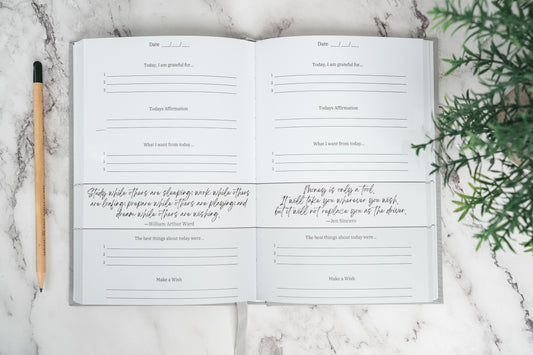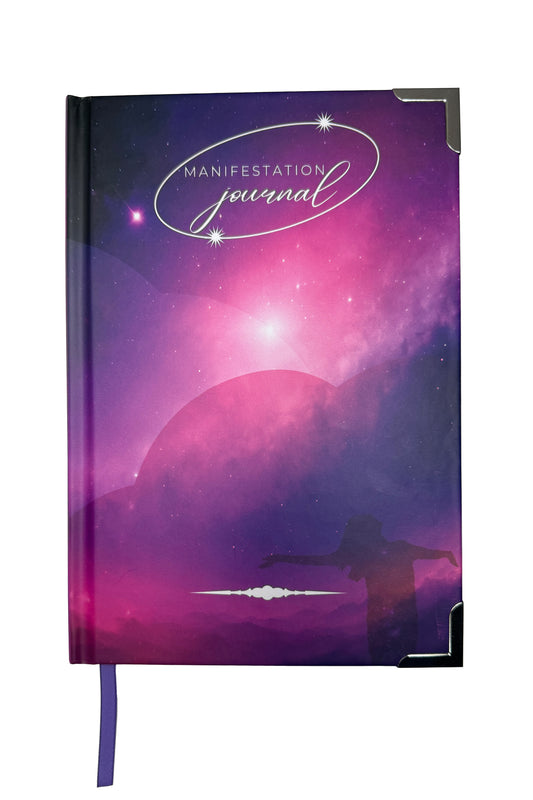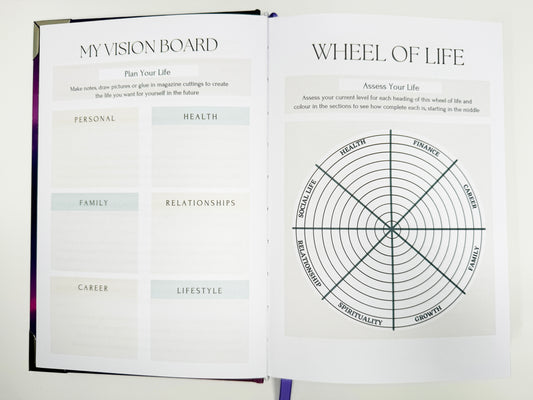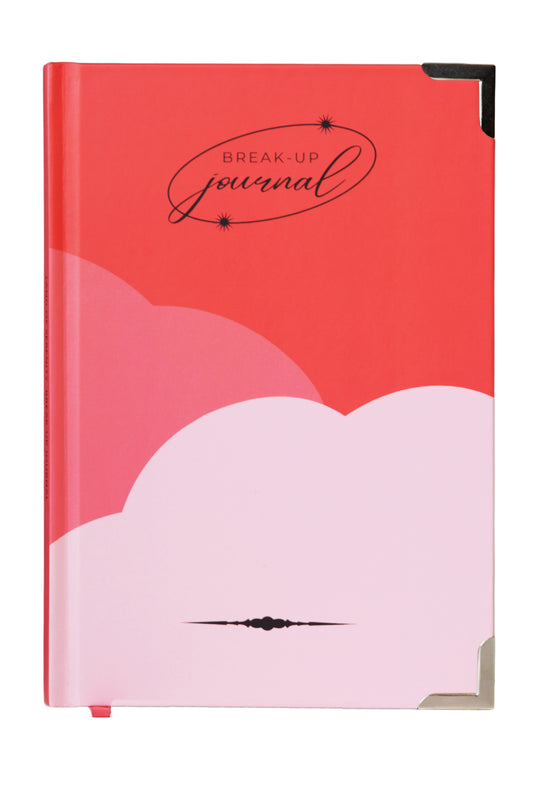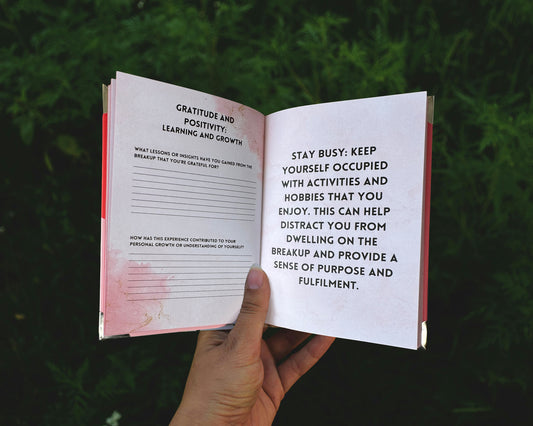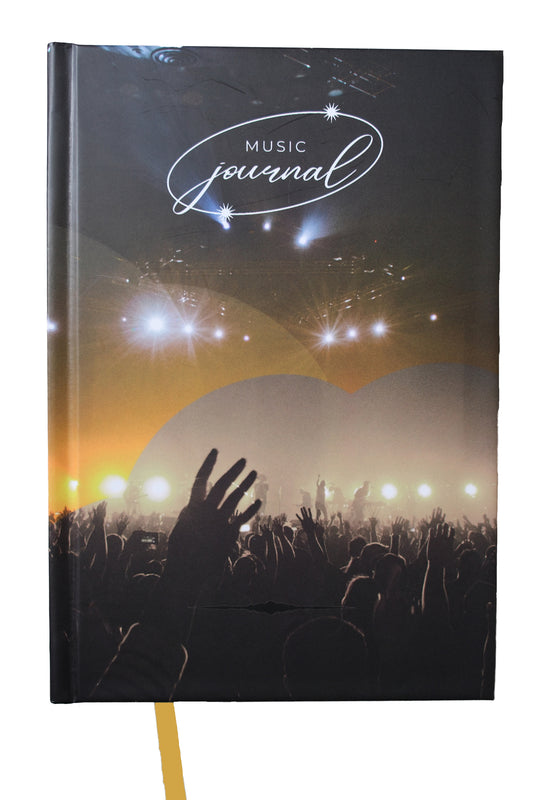Collection: Selfcare Journals
Self Care Journal: The Complete Guide to Building a Healthier, Happier You
Our self care journals for women and men are thoughtfully crafted to promote mental well-being and personal growth. Each journal features uplifting prompts, mindfulness exercises, and creative outlets designed to help you manage anxiety, boost positivity, and manifest your dreams. With sections for gratitude, goal-setting, and self-reflection, our journals provide a structured path to healing and empowerment. Perfect for those on a journey to mental wellness and personal development.
Choose the journal that resonates with you, and embark on a journey of self-discovery, growth, and well-being. With our Anxiety Journal and Positivity Journal by your side, you'll have the tools to manage anxiety and nurture a brighter, more optimistic outlook on life. Start your transformative journey today and experience the positive impact of journaling on your mental and emotional health.
-
Anxiety Journal - for Calm & Clarity – Guided Prompts for Stress Relief & Mental Wellbeing
Regular price £14.99 GBPRegular priceUnit price / per -
Positivity Journal - for Daily Joy & Gratitude – Guided Prompts for a Brighter Mindset
Regular price £14.99 GBPRegular priceUnit price / per -
Manifestation Journal - for Goal Setting & Positive Energy – Guided Prompts to Attract Your Dream Life
Regular price £12.99 GBPRegular priceUnit price / per -
Breakup Journal - for Healing & Closure – Guided Prompts for Letting Go & Moving On
Regular price £12.99 GBPRegular priceUnit price / per -
Music Journal - for Mindful Listening & Mental Wellbeing – 171 Albums to Discover & Reflect On
Regular price £14.49 GBPRegular priceUnit price / per
Introduction to Self Care Journaling
What is a Self Care Journal?
A self care journal is a personal space dedicated to promoting your emotional, mental, and physical wellbeing through intentional reflection, tracking, and habit formation. Unlike traditional diaries, a self care journal uses structured prompts, wellness trackers, and positivity-based practices to support your overall wellness journey.
Why Self Care Journals Are Important for Mental and Emotional Health
In today's fast-paced world, stress, burnout, and emotional fatigue are all too common. A self care journal provides a grounding tool to reconnect with yourself, decompress your thoughts, and gain clarity. It helps you identify triggers, celebrate small wins, and keep track of habits that boost your mood and energy.
The Connection Between Journaling and Mindfulness
Journaling is inherently mindful. It slows you down, encourages present-moment awareness, and nurtures self-compassion. Regular journaling helps build emotional intelligence, fosters gratitude, and nurtures a stronger relationship with your inner world — all cornerstones of mindfulness.
Benefits of Using a Self Care Journal
Stress Reduction and Emotional Clarity
One of the most immediate benefits of a self care journal is the emotional relief it offers. Writing gives your worries a place to land. By putting your emotions into words, you can begin to make sense of them, which significantly reduces mental clutter and stress. This reflective process can help you gain insight into what triggers certain emotional reactions and guide you to healthier responses in the future. For people who experience anxiety or racing thoughts, journaling becomes a calming daily ritual — a safe space to release and process.
Building Healthy Daily Habits
A self care journal isn't just about your feelings — it's also about your actions. Many journals include habit trackers or space for recording routines such as drinking water, taking breaks, exercising, eating healthily, or limiting screen time. Over time, logging your behaviours creates accountability and reinforces patterns that support your wellbeing. For example, tracking how often you walk outdoors or practice meditation can help you notice the positive effects on your mood and energy levels.
Tracking Personal Growth and Wellbeing
One of the most powerful, long-term benefits of journaling is the ability to reflect on your growth. When you look back at past entries, you'll notice progress that might have otherwise gone unrecognised. Did you handle a recent challenge more calmly? Are your moods improving with better self-care? These micro-wins build over time, and seeing your journey unfold on paper builds confidence and motivation. You may also uncover recurring patterns — such as negative self-talk or burnout cycles — and learn how to intervene earlier in the future.
Boosting Confidence and Positive Thinking
Incorporating gratitude logs, affirmation writing, or proud moments into your self care journal reprograms your mind to look for the good. This is more than just feel-good fluff — it's rooted in neuroscience. Regularly recording things you're thankful for or proud of strengthens the neural pathways associated with optimism and resilience. Instead of defaulting to self-criticism or worry, journaling builds a habit of self-encouragement and constructive thinking.
Enhancing Emotional Intelligence
By regularly exploring your thoughts, feelings, and reactions, you begin to understand not only what you feel — but why you feel it. This increased self-awareness fosters emotional intelligence: the ability to identify, understand, and manage your emotions and relate to others more empathetically. This skill enhances relationships, decision-making, and personal boundaries.
Supporting Physical Health and Sleep
What affects the mind affects the body. Journaling can indirectly support physical health by encouraging routines that promote restful sleep, reduce stress hormones, and improve energy levels. Writing before bed, for instance, helps declutter the mind and ease anxiety, leading to deeper, more restorative sleep. Some users even track symptoms (e.g., headaches, fatigue, PMS) alongside lifestyle habits to notice patterns that affect their physical health.
Strengthening Goal Achievement and Accountability
A journal acts as your personal progress partner. Writing down your goals — even small ones — makes them more tangible. Whether you're aiming to reduce screen time, read more books, or improve work-life balance, a self care journal helps you set intentions, break goals into manageable steps, and celebrate each milestone.
Encouraging Self-Compassion
Finally, a self care journal is a space free from judgment. You're not performing for anyone else — you're meeting yourself exactly where you are. On hard days, your journal can be a space of emotional validation and self-kindness. Over time, this nurtures a gentler internal dialogue and builds a stronger, more compassionate relationship with yourself.
Types of Self Care Journals
Guided Self Care Journals
These journals come with pre-written prompts, affirmations, and checklists. They're perfect for beginners or anyone who feels overwhelmed by a blank page.
Daily Reflection Journals
Focused on end-of-day reflections, these journals help you recap your emotions, evaluate what worked, and plan improvements for tomorrow.
Gratitude and Affirmation Journals
Designed to cultivate optimism, these journals prompt users to list things they're thankful for and affirmations that uplift their spirit.
Wellness and Habit Tracking Journals
These include sections for water intake, exercise logs, sleep patterns, mood check-ins, and even diet tracking — ideal for people aiming for holistic health.
Creative and Freewriting Journals
If you prefer less structure, a creative journal offers freedom to draw, doodle, brain dump, or explore ideas without rules.
Anxiety Journals
Anxiety Journals are focused on identifying triggers, managing anxious thoughts, and calming the mind with structured prompts. They often include breathing techniques, grounding exercises, and CBT-inspired writing tasks.
Positivity Journals
Aimed at enhancing optimism, positivity journals encourage users to reframe negative thoughts, highlight daily joys, and train the mind to seek silver linings.
Manifestation Journals
Built on the law of attraction principles, these Manifestation journals help you visualise your goals, write affirmations, and script your desired future with intention and clarity.
Breakup Journals
Specifically designed for healing after a relationship ends, breakup journals guide you through processing emotions, rediscovering self-worth, and setting new boundaries.
Music Journals
Perfect for music lovers, these music journals encourage self-expression through lyrics, playlists, musical memories, and emotional reflections tied to sound.
Wellness Journals
These wellness journals focus on whole-body wellbeing — combining mental, emotional, physical, and spiritual health. They often feature trackers, mood logs, self-care planners, and lifestyle goal sheets.
Grief Journals
Used for processing loss, grief journals offer a therapeutic outlet to honour memories, express emotions, and gently navigate the grieving process.
Wellbeing Journals
These wellbeing journals are holistic in design — incorporating mood trackers, gratitude logs, habit planning, self-reflection prompts, and health check-ins all in one place.
Goal Setting Journals
Goal setting journals focused on productivity and self-improvement, these journals help you define SMART goals, break them into actionable steps, track deadlines, and celebrate wins.
Overthinking Journals
Created to untangle anxious thought loops, overthinking journals provide structured prompts that challenge irrational thinking and encourage mindful rewrites.
Growth Journals
Personal development tools at heart, growth journalsq centre around reflection, learning, feedback, skill tracking, and long-term self-mastery.
Journals of Reflection
Often minimalist, these journals of reflection give you space to pause and ponder deeper questions — focusing on meaning, purpose, and values.
Healing Journals
Blending self-compassion and emotional release, healing journals support recovery from trauma, heartbreak, burnout, or past wounds through reflection and self-nurturing exercises.
Spiritual Journals
These spiritual journals explore your spiritual path through questions of meaning, belief, connection, and peace. Includes meditation logs, prayers, intuitive writing, and symbolic dreamwork.
Worry Journals
Offering a safe container for your fears, worry journals help externalise anxieties and address them logically or compassionately.
Daily Journals
Daily Journals meant for everyday use, these can include morning and evening reflections, gratitude entries, mood tracking, and time planning.
Journals for Mental Health
Journals for Mental Health backed by psychology, these support people navigating anxiety, depression, PTSD, or ADHD. They provide structure, prompts, grounding techniques, and symptom tracking.
Self Reflection Journals
These Self Reflection Journals go deeper into who you are — your choices, values, and identity. Ideal for self-discovery and building insight into your emotional world.
Positive Wellness Journals
These Positive Wellness Journals affirmations, gratitude, physical health goals, and mental clarity into a single tool focused on uplifting your lifestyle and mindset.
Journals of Loss and Trauma
These Journals of Loss and Trauma are carefully crafted to help individuals process deep pain from loss, abuse, or major life events. They honour grief while gently encouraging recovery.
Journals for Depression
Designed with empathy, these Journals for Depression include low-effort prompts, gentle tracking, self-care check-ins, and motivational elements that support those battling depressive thoughts.
Health and Wellbeing Journals
These Health and Wellbeing Journals track physical symptoms, medical routines, fitness goals, mental health, nutrition, and holistic wellness in an integrated format.
Emotional Wellness Journals
Centred on emotions, these Emotional Wellness Journals help you explore mood patterns, triggers, boundaries, emotional regulation, and compassion in a structured yet supportive way.
Key Features of an Effective Self Care Journal
Daily Prompts and Reflection Questions
Effective self care journals often include thoughtfully crafted daily prompts. These questions help users engage in self-inquiry without feeling overwhelmed. For example, morning prompts may focus on setting intentions or visualising your best self for the day. Evening prompts encourage reflection on emotional challenges or wins. A good prompt transforms a blank page into a meaningful space for emotional release and mental clarity.
Mood and Habit Trackers
Trackers are essential tools for pattern recognition. Mood trackers use colours or icons to help you visually log how you're feeling each day. Over time, they reveal emotional trends that can help you understand triggers or lifestyle impacts. Habit trackers, on the other hand, promote consistency with healthy practices like hydration, journaling itself, movement, or tech-free time. Seeing your progress can motivate you to maintain and expand your routines.
Goal-Setting Pages
Setting goals gives your journaling a forward-looking dimension. Effective self care journals include dedicated space to identify short-term and long-term goals. These pages might consist of a goal statement, action steps, progress tracking sections, and check-in dates. Whether you're focusing on fitness, mindset, career, or emotional healing, visualising progress through written goals strengthens focus and commitment.
Space for Gratitude and Affirmations
A gratitude log is one of the most powerful tools in any self care journal. It shifts focus from scarcity to abundance and improves emotional wellbeing. Affirmations, meanwhile, work to reframe negative thought patterns and build confidence. Many journals reserve a small area each day for gratitude entries and a few lines for positive self-talk — these small rituals can dramatically boost optimism and self-worth over time.
Self-Reflection and Progress Sections
Beyond daily entries, the best self care journals encourage periodic reviews — weekly, monthly, or quarterly. These sections help users identify wins, reassess goals, and take stock of emotional or behavioural trends. A self-reflection page might ask, "What am I proud of this month?" or "What challenges did I overcome?" Reflecting consistently ensures you stay aware of your growth, rather than getting lost in daily fluctuations.
Flexible Layout and Accessibility
Effective journals strike a balance between structure and freedom. While some users thrive on full-page prompts, others prefer a minimalist format with more space for free expression. A flexible layout — with blank space, prompts, trackers, and creative sections — allows journaling to feel less like a task and more like a companion. Accessibility also matters — easy-to-navigate sections, durable binding, or even digital options increase usability and encourage long-term consistency.
Inspiration and Encouragement
Motivational quotes, gentle reminders, or curated wellness tips scattered throughout the pages can keep the user engaged and supported. Especially on difficult days, reading a calming quote or encouragement can spark the motivation needed to write and reflect. A journal that feels like it's speaking back to you — in kindness — can make the practice truly transformative.
How to Start a Self Care Journal
Choosing the Right Journal Format
Your journaling journey begins with choosing the correct format — one that aligns with your lifestyle, preferences, and goals. You may prefer:
- Physical journals offer a tactile feel, creative freedom, and a screen-free experience. They're ideal for those who enjoy writing by hand and value personal keepsakes.
- Digital journals or apps like Notion, Evernote, Day One, or dedicated journaling apps for those who want portability, password protection, and multimedia integration.
- Printable journal templates, which combine the best of both — structured prompts and physical interaction, with the ability to personalise. Think about how and when you're most likely to write. If you already use digital tools for planning, a digital journal might integrate better into your routine.
Setting a Routine and Finding the Best Time to Journal
Consistency is more important than quantity when it comes to journaling. Establish a simple routine:
- Morning journaling helps set intentions, clarify goals, and visualise a positive day ahead.
- Evening journaling is best for reflection, emotional unloading, and gratitude.
- Midday journaling works for emotional check-ins and stress relief. Choose a time when your mind feels relatively still, and treat your journaling as a sacred, non-negotiable self-care moment. Start small — even five minutes a day can create momentum.
Tips for Overcoming Writer's Block
Staring at a blank page can feel intimidating. Here's how to keep your flow going:
- Use simple, structured prompts like "Today I feel…", "One thing I need is…", or "What I learned today is…"
- Write in bullet points or lists if full paragraphs feel overwhelming.
- Include drawings, stickers, or doodles for emotional expression.
- Allow stream-of-consciousness writing — write whatever comes to mind without editing or censoring. Remember: your journal is for you only. It doesn't need to be perfect. It just needs to be honest.
Making Journaling a Consistent Habit
To truly feel the benefits of a self care journal, make it a ritual rather than a random activity:
- Pair journaling with an existing habit, like morning tea, skincare, or bedtime reading.
- Keep your journal visible — by your bedside, at your desk, or in your bag.
- Use reminders or phone alerts if using a digital journal.
- Celebrate small wins: check off your journaling days or reward yourself for hitting a streak. Also, forgive yourself if you miss a day or two — consistency over perfection is what builds long-term change.
Personalising Your Journaling Style
There's no one "correct" way to journal. Your style should match your personality and emotional needs:
- Are you more visual? Use colour-coding, stickers, or drawing.
- Prefer minimalism? Stick with brief entries and clean layouts.
- Like structure? Follow a guided template with prompts.
- Need freedom? Use blank pages for expressive writing or mood collages. Your journal is your safe space — design it to feel inviting and non-restrictive.
Choosing Your First Prompts
If you're unsure how to begin, start with foundational prompts that help you ground in the moment:
- What do I need right now to feel supported?
- What is one thing I'm grateful for today?
- What's one emotion I want to understand better?
- What does self care look like for me? These questions build the habit of self-inquiry and invite you to tune into your emotional and mental landscape gently.
Giving Yourself Permission to Evolve
As your needs change, your journaling will evolve. What works in the beginning may shift over time. Allow yourself the flexibility to:
- Change formats (e.g. paper to digital)
- Try new prompts or themes.
- Take breaks when needed.
- Come back with fresh intention. Remember, your journal is a mirror of your growth. Let it be fluid, not rigid.
Starting a self care journal doesn't require perfection, long hours, or beautiful handwriting — it just requires intention. The most important thing is to begin.
Journaling prompts serve as gentle guides to help you explore your inner world, organise your thoughts, and reflect on your emotional wellbeing. They're especially useful on days when you don’t know what to write about or need clarity on a specific feeling, challenge, or goal. Below are detailed types of prompts to support your daily journaling practice.
Morning Routine Prompts
Start your day with intention, motivation, and a mindset of clarity. Morning prompts help shape your thoughts and prepare you mentally and emotionally for the day ahead.
- What are my top 3 priorities today and why do they matter?
- How do I want to feel by the end of today?
- What's one act of kindness I can show to myself or someone else today?
- What would make today feel successful?
- What is one thing I'm looking forward to today?
These prompts bring focus, calm, and purpose into your morning, helping you take control of your mindset.
Evening Reflection Prompts
End your day by winding down, releasing stress, and checking in with yourself. Evening journaling encourages closure, gratitude, and emotional balance.
- What went well today, and how did it make me feel?
- What challenged me today, and how did I respond?
- What do I wish I had done differently?
- What am I proud of accomplishing today?
- What emotions stood out for me today, and why?
Writing these reflections helps release built-up tension, deepen self-awareness, and prepare your mind for restful sleep.
Gratitude & Positivity Prompts
Cultivate an attitude of thankfulness and retrain your mind to focus on what's working. Gratitude journaling is a powerful tool for happiness and emotional resilience.
- What are three things I'm grateful for today, big or small?
- Who made a positive impact on my life recently?
- What is something I usually take for granted that I'm appreciating now?
- What made me smile or laugh today?
- How have I seen growth or progress in myself recently?
Over time, these prompts help rewire your brain toward optimism and positivity.
Mental Health & Emotional Check-In Prompts
These prompts allow you to connect with your inner state, explore difficult emotions, and build emotional literacy.
- What emotion am I feeling most strongly right now, and why?
- What thoughts have been repeating in my mind today?
- What do I need to feel emotionally safe right now?
- Am I being too hard on myself about something?
- What's draining my energy, and what's replenishing it?
This self-exploration leads to healthier emotional regulation and stronger self-compassion.
Long-Term Goal and Vision Prompts
These prompts help you envision the future, clarify your dreams, and break down big aspirations into manageable steps.
- What is one personal goal I want to accomplish in the next 30 days?
- Where do I see myself in 5 years emotionally, physically, and spiritually?
- What kind of person am I becoming, and what do I need to support that growth?
- What fears are holding me back from going after what I truly want?
- What does success look like to me — not by society's standards, but my own?
Use these prompts regularly to track personal development and stay aligned with your values.
Self-Love and Confidence Prompts
These help you foster a kind relationship with yourself and counteract self-doubt with strength, clarity, and grace.
- What do I love most about who I am today?
- How can I honour my needs more consistently?
- What's a kind thing I've done for myself recently?
- How do I show up for others, and how can I show up for myself in the same way?
- If I spoke to myself like my best friend, what would I say?
By practicing these prompts, your inner voice becomes more encouraging and compassionate.
Prompts for Overcoming Difficult Times
Life comes with challenges, and these prompts help you process heavy emotions, transitions, or painful moments.
- What am I grieving right now, even if it's not a noticeable loss?
- What support do I need, and how can I ask for it?
- What lesson can I take from this hardship?
- What do I need to let go of to move forward?
- How can I be gentle with myself during this phase?
These questions hold space for emotional healing and can be used during therapy or periods of reflection.
Creativity and Expression Prompts
Sometimes self-care means engaging with joy, inspiration, and creativity. Use these prompts to awaken imagination:
- If I could create anything right now, what would it be and why?
- What does my ideal self-care day look like?
- What music, art, or books inspire me and why?
- If my life were a movie right now, what scene would I be in?
- What's something playful or artistic I want to try?
Journaling doesn't always have to be serious — it can be fun, visionary, and expressive.
Prompts for Relationships and Boundaries
Use journaling to evaluate how your relationships support or hinder your wellbeing.
- Who in my life makes me feel safe, seen, and supported?
- What boundaries do I need to strengthen?
- Where am I giving too much of myself?
- What values do I want to honour in my relationships?
- How can I improve communication in my closest relationship?
These prompts help clarify your social environment and align it with your mental health needs.
Monthly Reflection Prompts
Use these prompts at the end of each month to review progress and reset intentions:
- What were my biggest emotional wins this month?
- What challenged me the most, and how did I grow from it?
- What habits supported my wellbeing and which ones didn't?
- What intention do I want to carry into next month?
- What's something I want to forgive myself for?
Monthly reflections keep you grounded, accountable, and inspired to evolve.
Creating Your Own Prompts
Feel free to write your own prompts based on what you're experiencing. Prompts can start with:
- "Right now I'm wondering…"
- "I wish I understood…"
- "Today I'm proud because…"
- "I need more of…"
- "I want to remind myself that…"
Let your inner dialogue guide your curiosity and exploration.
- Prompts are tools — not rules. Use them to unlock insight, deepen compassion, and create a journal practice that evolves with you.
Self Care Journal Ideas by Purpose
Self care isn't one-size-fits-all. Your needs vary depending on your emotional state, life stage, personal goals, or current challenges. That's why tailoring your journaling practice to a specific purpose can help you focus and feel more connected to the process. Below are detailed self care journal ideas organised by different wellness goals.
Journaling for Stress Relief
Use your journal as a pressure valve to offload tension and calm the nervous system.
- Dump your thoughts: Write a stream-of-consciousness entry with no structure.
- Create a stress inventory: List what's causing pressure, and note what's within your control.
- Use calming prompts: Try "What's one thing I can do to feel more grounded?"
- Track stress triggers: Observe patterns linked to environments, people, or situations.
- End with soothing affirmations: "I release what I cannot control. I choose peace."
Stress relief journaling is best done regularly — especially at the end of demanding days.
Journaling for Anxiety and Mental Clarity
This type of journaling helps name and disarm anxious thoughts.
- Write down your fears and ask: Is this thought true? What's the evidence?
- Create a "calm toolkit" list: breathing techniques, safe places, supportive people.
- Use reframing prompts: "What's the best-case scenario?"
- Track symptoms and responses: How did journaling affect your anxiety score?
- End with a grounding practice: Describe 5 things you can see, 4 you can touch, etc.
It builds self-awareness, cognitive resilience, and confidence in managing anxious spirals.
Journaling for Productivity and Focus
If you're looking to optimise your time and energy, use journaling as a planning and review tool.
- Daily planner spread: Top 3 priorities, secondary tasks, time blocks.
- Reflection prompt: "What distracted me today, and how can I improve?"
- Energy check-ins: Track your high-focus windows for better scheduling.
- Celebrate micro-wins: Reinforce progress.
- Write a focus affirmation: "I work with clarity, confidence, and calm."
This approach blends self-discipline with self-compassion, avoiding burnout while staying accountable.
Journaling for Gratitude and Happiness
Gratitude journaling increases dopamine and oxytocin — your natural happiness hormones.
- List 3 things you're thankful for daily — people, moments, or feelings.
- Capture sensory joys: "The smell of coffee, warm sun on my face."
- Write about one kind gesture you received or gave.
- Include quotes or poems that lift your mood.
- Start a 'Happiness Jar' section to record joyful moments.
This type of journal is excellent for reducing negativity bias and building optimism.
Journaling for Self-Love and Confidence
This is your space to remember your worth and build trust in yourself.
- Affirmation log: "I am enough." "I am resilient."
- Track the compliments you receive and how they made you feel.
- Describe your strengths and how you use them.
- Write letters to your inner child or past self.
- Document wins, no matter how small.
The more you show up for yourself in writing, the stronger your self-image becomes.
Journaling for Healing and Emotional Recovery
Ideal for moving through grief, heartbreak, trauma, or burnout.
- Write your story as a way to release pain.
- Use prompts like "What do I need to forgive myself for?"
- List what you're grieving — loss doesn't have to be death.
- Name emotions instead of avoiding them: "Today, I feel sorrow, anger, hope."
- Create a timeline of healing milestones.
This journal becomes a trusted companion during hard times and transitions.
Journaling for Goal-Setting and Personal Growth
Turn your journal into a blueprint for success.
- Set SMART goals (Specific, Measurable, Achievable, Relevant, Time-bound).
- Break them into steps and track progress.
- Visualise your future self through future letters.
- Use monthly check-ins to review what's working.
- Write about setbacks as learning moments.
Goal-focused journaling keeps you aligned with your long-term vision.
Journaling for Spiritual Growth
Deepen your connection with self, nature, the divine, or the universe.
- Reflect on daily synchronicities.
- Record prayers, affirmations, or spiritual quotes.
- Explore existential questions: "What is my purpose?"
- Write after meditating to process insights.
- Track rituals, moon cycles, or sacred routines.
This journal becomes a sacred tool for inner alignment and meaning.
Journaling for Physical Wellness
Wellbeing journals that support body-based self-care:
- Track meals, hydration, exercise, and sleep.
- Record symptoms or pain levels.
- Note how movement affects your mood.
- Write intentions before or after workouts.
- List self-care activities like massages, baths, or rest.
It bridges the mind-body connection and supports sustainable health habits.
Journaling for Creativity and Play
Your journal can also be a joyful playground.
- Create dream boards or vision spreads.
- Doodle, sketch, or collage.
- Write short stories, poems, or song lyrics.
- Track new hobbies and how they make you feel.
- Use prompts like "What lights me up inside?"
Creative journaling reawakens inspiration, imagination, and playfulness.
By matching your journaling to your current emotional or lifestyle need, you turn it into a powerful self-care practice tailored just for you. Whether you're chasing clarity, calm, creativity, or confidence — there's a journaling path that leads you there.
Self Care Journals for Different Audiences
Self care is deeply personal, and journaling should reflect that. Different audiences — from teens to professionals — have distinct emotional needs, routines, and life challenges. Tailoring journal formats, language, and prompts to specific user groups ensures deeper impact and long-term engagement. Here's how self-care journals vary across different demographics and use cases.
Self Care Journals for Women
Women often face unique emotional, hormonal, and societal pressures. Journals tailored for women can include:
- Menstrual and hormonal cycle trackers to align mood, energy, and self-care with natural rhythms.
- Self-love and body positivity prompts mental health and confidence.
- Work-life balance tools for managing family, work, and personal time.
- Empowerment sections for affirmations, values, and leadership goals.
- Emotional release pages for processing overwhelm or burnout. These journals often include calming aesthetics, soft colour palettes, and nurturing language.
Self Care Journals for Men
Men may struggle with societal expectations that discourage emotional expression. Journals for men help break this barrier through:
- Straightforward, non-fluffy prompts such as "What am I avoiding?" or "What's draining me?"
- Goal and productivity layouts to align emotional well-being with action-based routines.
- Stress and anger management tools, like cognitive reframing and physical health logs.
- Minimalist design and neutral tones to reduce stigma and increase comfort. These journals support emotional growth, resilience, and mental strength without compromising masculine identity.
Teen Self Care Journals
Teenagers need emotionally safe, judgment-free tools to process life's rapid changes.
- Mood and peer interaction trackers for emotional pattern recognition.
- Prompts for identity exploration, like "Who am I becoming?"
- Creative spaces for drawing, doodling, and venting.
- Social media & screen time reflections to promote digital wellbeing.
- Confidence-building exercises around boundaries, values, and self-expression. Designed with fun layouts, stickers, quotes, and vibrant colours, teen journals help build healthy emotional habits early on.
Self Care Journals for Students
Students face academic pressure, social challenges, and transitional stress. Journals for students include:
- Study stress reflection prompts to manage anxiety and avoid burnout.
- Time management pages for deadlines, routines, and breaks.
- Mindfulness and gratitude sections to stay grounded amid academic chaos.
- Progress trackers for personal and academic growth.
- Campus wellbeing prompts for self-care within university or school settings. Compact and portable, these journals are designed for daily or weekly use alongside busy study schedules.
Self Care Journals for Professionals
Professionals often experience stress from leadership roles, demanding schedules, and work-life imbalance.
- Burnout checklists and recovery plans to monitor fatigue.
- Morning clarity and evening reflection pages for intention-setting.
- Productivity tools blended with emotional tracking.
- Boundary-setting exercises for managing meetings, clients, and digital overload.
- Professional development vision pages aligned with emotional well-being. Designed in sleek formats with a focus on clarity, these journals suit office, travel, or remote work environments.
Self Care Journals for Parents and Caregivers
Caregivers are often overlooked in wellness conversations. These journals offer:
- Emotional check-ins: "What do I need right now that I'm not asking for?"
- Time-blocking for self-care moments.
- Gratitude reflections focused on family and parenting wins.
- Space to vent or brain-dump stress.
- Gentle reminders of self-worth and rest. Soft, nurturing designs paired with realistic self-care suggestions make these a daily lifeline for overwhelmed parents.
Self-Care Journals for People with Chronic Illness or Disability
These journals support individuals managing long-term physical or mental health challenges:
- Symptom trackers integrated with mood logs.
- Energy pacing layouts: what depletes vs. what restores.
- Medical appointment logs and medication notes.
- Prompts like "What made me feel strong today?"
- Accessibility features: large print, easy-to-hold design, voice-assisted digital versions. These journals focus on empowerment, adaptation, and daily encouragement.
Digital Self Care Journals (Apps and Templates)
Not everyone prefers paper. Digital journals cater to modern lifestyles:
- App-based journaling with daily prompts and mood tracking.
- Customisable Notion and Google Docs templates.
- Automated reminders to encourage habit formation.
- Data visualisation for mood, energy, or sleep patterns.
- Multimedia-friendly features like voice notes, images, or video entries. Ideal for on-the-go users, tech-savvy professionals, and anyone who prefers a private, syncable journaling system.
Gender-Neutral and Inclusive Journals
Wellness is for everyone. Inclusive journals:
- Avoid gendered language and stereotypes.
- Offer neutral design, colour schemes, and prompt tones.
- Support diverse identities with inclusive emotional language.
- Provide affirming prompts: "What makes me feel seen and safe?"
- Feature pages on community, pride, and belonging. These journals ensure representation and support for LGBTQ+, neurodiverse, and marginalised individuals.
Integrating Journaling Into a Self Care Routine
Pairing Journaling with Meditation and Mindfulness
Begin or end meditation with a few lines of reflection. Journaling helps anchor your mindful experience and bring more awareness to your day.
Using Journals with Fitness and Wellness Goals
Track your physical activity, energy levels, and rest days. Journaling helps align your mind-body goals and prevents burnout.
Combining Journaling with Therapy or Coaching
Bring insights from your journal into your therapy or coaching sessions. It builds continuity and allows more profound exploration of recurring patterns.
How Journaling Supports Better Sleep and Relaxation
Night journaling reduces mental clutter, prevents rumination, and signals your body that it's time to wind down.
Common Challenges with Self Care Journals
Lack of Consistency or Motivation
Start small. Use visual cues or accountability partners. Even one line a day is progress.
Perfectionism and Overthinking Entries
Remember, this journal is for you. There are no rules. Let go of neatness, structure, or grammar. Focus on honesty over aesthetics.
Finding the Right Prompts That Work for You
Experiment. Not every prompt will resonate. You can reuse favourite ones or make your own depending on your mood and needs.
Conclusion
A self care journal is more than just a notebook — it's a mirror, a mentor, and a sanctuary. Whether you use it to track habits, process emotions, or fuel your growth, it's a personal and powerful practice that brings clarity, calm, and confidence. Start where you are, use what you have, and build your own rhythm — your future self will thank you.
FAQs About Self Care Journals
Are self-care journals worth it?
Yes — they reduce stress, improve self-awareness, support habit-building, and promote long-term emotional wellbeing.
What are the 4 basics of self-care?
- Physical
- Emotional
- Social
- Spiritual self-care
What are 10 self-care practices?
- Sleep hygiene
- Daily journaling
- Healthy eating
- Regular hydration
- Exercise
- Gratitude practice
- Digital detox
- Setting boundaries
- Practicing mindfulness or meditation
- Talking to a therapist or support group
What are the 7 pillars of self-care?
- Mental
- Emotional
- Physical
- Environmental
- Spiritual
- Recreational
- Social
How to create a self care journal to sell?
Define your target audience, outline journal sections (e.g., prompts, trackers, reflections), design the layout, choose between digital or print formats, then publish and market it on platforms like Etsy, Amazon KDP, or Shopify.
- Identify a niche or audience
- Plan structured sections: prompts, trackers, reflections
- Design layout (digital or printable)
- Print professionally or sell as a PDF
- List on Etsy, Amazon KDP, Shopify, or your own website
How to start a self care journal?
Pick a journal format (physical or digital), set a daily routine, use beginner-friendly prompts, write consistently, and adapt your journaling style as your needs evolve.
- Choose your format (physical or digital)
- Set a journaling routine (morning or night)
- Begin with simple prompts like "How do I feel today?"
- Focus on consistency over perfection
What to write in a self care journal?
- Daily emotions or moods
- Gratitude entries
- Affirmations
- Reflections on habits and self-care routines
- Goals and progress check-ins
Can a self-care journal help with anxiety?
Yes — it helps track triggers, release thoughts, practice grounding, and improve emotional clarity.
How do I write my personal journal?
Write honestly and without judgment. Use prompts, freewriting, lists, or reflections to express thoughts, track habits, and explore emotions.
- Start honestly, without judgment
- Use prompts or write freely
- Include what you feel, think, or need
- Focus on expression, not grammar or structure
What are the questions for the self-care journal?
- How do I feel today?
- What do I need right now?
- What made me smile today?
- What am I grateful for?
- What's weighing on my mind?
Our Full Range of Journals for Every Emotion and Intention
In addition to our specialised collections, we also offer a thoughtfully curated range of journals designed to support you through various life experiences and emotional journeys. Our collection includes:
Anxiety Journal, Positivity Journal, Manifestation Journal, Breakup Journal, Wellness Journal, Manifesting Journal, Mindfulness Journal, Grief Journal, Journals for Women, Wellbeing Journals, Goal Setting Journal, Happiness Journal, Overthinking Journal, Growth Journals, Journal of Reflection, Healing Journal, Spiritual Journal, Hardback Journal, Worry Journal, Best Journals for Mental Health, Daily Journals, Mindfulness Journals for Men, Self Reflection Journal, Positive Wellness Journal, Daily positive journal, Journal for emotions, Daily greatness journal, Journal for Positive Thinking, Journal of Loss and Trauma, Journals for Depression, Beautiful Journals, Daily Wellbeing Journal, Health and wellbeing journal, Positive mind journal, Daily Manifestation Journal, Mindfulness Journal for Anxiety, Emotional Wellness Journal, Mental Wellbeing Journal.
Each journal is crafted to guide reflection, promote emotional clarity, and empower personal growth.

